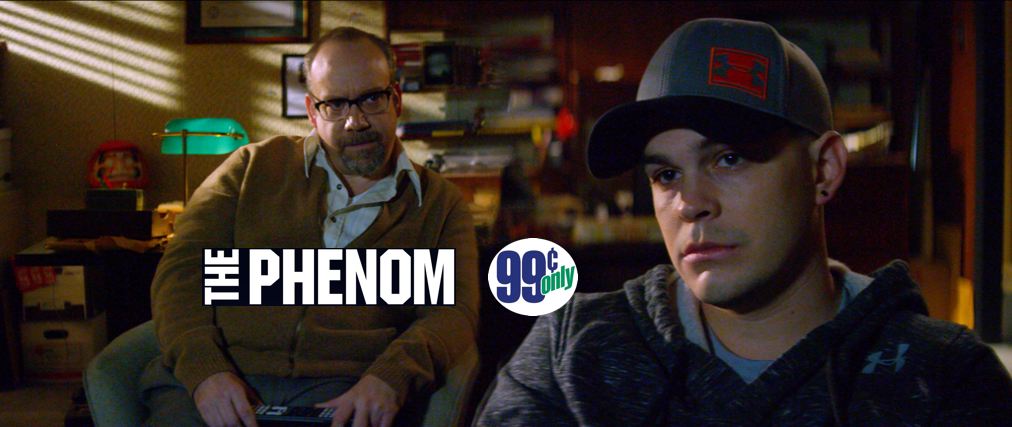The (Other) 99 Cent Movie of the Week: ‘The Phenom’
Every week, the folks at iTunes find a movie they like and make it available to rent for the low, low price of $0.99. I’m here to tell you whether that film is worth your hard-earned dollar.
Ok, the main $0.99 rental is a little Michael Bay film called 13 Hours: The Secret Soldiers of Benghazi. If you’ve been paying attention to politics at all in the last year, you’ve heard a lot about Benghazi. A little too much, in fact. And you’ll gain little insight from Bay’s ‘bombs over brains’ dramatization. Look, it’s not the worst movie Michael Bay has ever made. I said as much when I reviewed the film a few months ago. But ‘not the worst’ is not enough to make me sit through it again. Luckily, iTunes always picks a little-seen indie and offers it up at the same low price. So….
This week, Johnny Simmons plays a troubled but gifted young pitcher in The Phenom.
Do You Want to Explode?
With a cannon for a right arm, a spot on the big-league roster, and a big-money contract to match, rookie pitcher Hopper Gibson (Simmons) seems to have it all. That is until some serious control problems land him back in the minors. Tasting failure for the first time, he starts to see that there’s more to his life than balls and strikes. And that years of physical and emotional abuse at the hands of his overbearing father (Ethan Hawke) has left his psyche broken and battered. But a brilliant sports psychologist (Paul Giamatti) may be the key to helping young Hopper find his control on the mound … and control in his own life. Noah Buschel’s The Phenom does not suffer the same control issues. From that narrative, the talented writer/director crafts a complex and calculating little baseball drama.
This Is a Passing Thing for You
Buschel wastes little time getting to that drama. The opening moments of The Phenom find young Hopper in the middle of an in-game meltdown to the tune of five wild pitches. If you don’t follow baseball, just know that one wild pitch in a game is bad. Five in a row will lose a game … and land you in a shrink’s office. Through a tricky bit of editing, we find that’s exactly where Hopper is. So begins The Phenom. And so begins Buschel’s savvy deconstruction of the baseball film. So yeah, if you don’t follow baseball, don’t worry. The Phenom isn’t really a baseball film.
In fact, outside of that opening scene, there’s almost no baseball action in The Phenom. Rather than count balls and strikes on the field, Buschel keeps his incisive screenplay focused on the balls and strikes of the human condition. He finds a fascinating subject in his young pitcher. And he pulls a captivating performance from his young star.
Many of you will recognize Johnny Simmons from his supporting role in The Perks of Being a Wallflower (2012) or as Young Neil in Scott Pilgrim vs. the World (2010). But neither of those performances will prepare you for his nervy, introverted turn in The Phenom. His Hopper is wound tighter than a corkscrew for much of the film. But you always see a near volcanic energy bubbling beneath the surface. Every sideways glance and mumbled word from Hopper barely contains the bundled up energy inside. While that energy drives his competitive edge, it also makes him dangerous. Dangerous on the mound and dangerous in the world. Simmons plays the troubled young athlete with equal parts darkness and tenderness.
He’s pushed to either extreme throughout by co-stars Paul Giamatti and Ethan Hawke. And both actors bring depth and edge to their supporting roles – Giamatti with heartfelt empathy and Hawke with green-eyed menace.
Buschel’s patient approach to the story only enhances those extremes. I’m not sure I’ve ever experienced a film as calm or quiet as The Phenom … especially one with so much happening on an emotional level. But Buschel takes his time. And his tempered, observational approach to the story bolsters the film’s complex emotional landscape. But that landscape often feels like a minefield. And Buschel pushes his story into expressionist experimentation on several occasions – sharp shadows and wild lighting taking the story to darker, dangerous areas.
Buschel ends that story on a hopeful but ambiguous note with Hopper visiting his Dad before returning to the majors. His emotional state is still uncertain. But there’s a sense of self in every word Hopper utters. Still, it’s Hawke’s father that does most of the talking. The interaction is raw and emotional and utterly heartbreaking. Buschel lets the camera linger on the seasoned actor – not his younger star – for most of the scene. It’s a compelling choice. And it’s not one that many directors would make. As Hawke’s stern face twists into pangs of shame and rage and pride and remorse, you can’t help but sympathize … with him and with the son he’s spent his life terrorizing. It isn’t quite pure catharsis for either. But it’s as close as most humans will ever see. It has nothing and everything to do with baseball. Just like The Phenom.
Worth It?
You bet. The Phenom is thoughtful and precise and soulful in ways that most sports films dare not aspire. That’s not to say it’s perfect. Believe me, it isn’t. Buschel’s meandering style often trumps the natural grace of his story. And yes, that story does take a few too many cues from Good Will Hunting (1997). Still, you have to admire a film that takes as many chances as The Phenom does. And you have to admire that it so often succeeds in those risks. Bolstered by fantastic performances throughout, The Phenom becomes a clever, curve-ball of a psychological drama dressed up as a baseball film. It caught me off guard. I’m betting it’ll catch you off guard too. So drop that buck, give The Phenom a rip and see what it’s like when a film swings for the fences. But don’t be too disappointed if it comes up a little short of a homer. After all, it’s doubles that win games.



